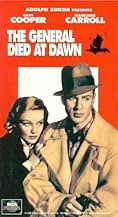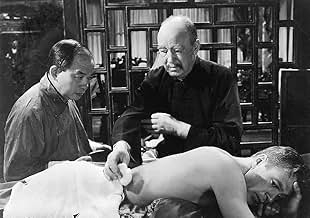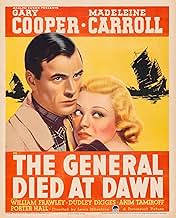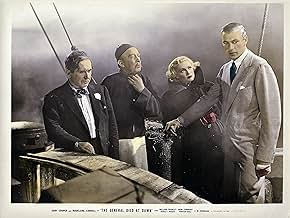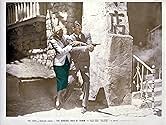CALIFICACIÓN DE IMDb
6.4/10
1.4 k
TU CALIFICACIÓN
Agrega una trama en tu idiomaAmid the anarchy of China, an American mercenary tangles with a ruthless warlord.Amid the anarchy of China, an American mercenary tangles with a ruthless warlord.Amid the anarchy of China, an American mercenary tangles with a ruthless warlord.
- Dirección
- Guionistas
- Elenco
- Nominado a 3 premios Óscar
- 1 premio ganado y 3 nominaciones en total
Lee Tong Foo
- Mr. Chen
- (as Lee Tung-Foo)
Hans Fuerberg
- Yang's Military Advisor
- (as Hans Furberg)
Irene Bennett
- Passenger
- (sin créditos)
Spencer Chan
- Killer
- (sin créditos)
Thomas Chan
- Houseboy
- (sin créditos)
- Dirección
- Guionistas
- Todo el elenco y el equipo
- Producción, taquilla y más en IMDbPro
Opiniones destacadas
Thanks to the cast of characters in here, led by the wise-cracking Gary Cooper and a pretty Madeline Carroll, this was a pretty interesting film. Some of the minor characters also made this movie to fun, notably Akim Tamiroff's "General Yang," as well as Bill Frawley''s "Brighton;" Porter Hall's "Peter Prrie/Peter Martin" and Dudley Digges' creepy busybody "Mr. Wu."
Nowaday, Digges and Tamiroff's characters would be played by real Asian actors and would be a bit more credible. Also, in a real-life situation, Cooper would have been eliminated early on after the bad guys had gotten his money.
Nevertheless, credibility issues aside (which you have to do in most movies, anyway, old and new), the good dialog, interesting faces, characters and cinematography all make this movie a lot better than I expected.
Nowaday, Digges and Tamiroff's characters would be played by real Asian actors and would be a bit more credible. Also, in a real-life situation, Cooper would have been eliminated early on after the bad guys had gotten his money.
Nevertheless, credibility issues aside (which you have to do in most movies, anyway, old and new), the good dialog, interesting faces, characters and cinematography all make this movie a lot better than I expected.
"The General Died at Dawn" features Gary Cooper in a role similar to the one he played in "For Whom the Bell Tolls" a couple of years later. Directed by Lewis Milestone the movie is visually stunning and exciting. Madeleine Carroll (fresh from her success in Hitchcock's "The 39 Steps")is very good as Cooper's love interest.Akim Tamiroff was nominated for an Oscar as the General.He's certainly a menacing figure here.But I think Philip Ahn as his second in command delivers the best performance.What subtle fanaticism he conveys.The movie is full of interesting twists in the storyline and except for the ending,which I found a bit silly,it is a solid movie.
Did you ever come in late to a movie and miss the beginning? You have to try hard to concentrate and catch up, all the while feeling off-balance and wondering how much you missed. That's the way this picture starts off, and I spent some time trying to 'fit in' to the plot. But this film's plot moves at break-neck speed and made me think it is an editing flaw.
Having recovered, I found the story completely original and refreshing (can't think of too many Chinese Civil War flicks!). I also found a lack of tension - what's the opposite of nerve-wracking? - as there is no sense of urgency to the proceedings. The principals were just fine; Gary Cooper, Madeleine Carroll and Akim Tamiroff, and special mention must be made of Philip Ahn, who was the personification of evil Japanese military in many WWII pictures.
It is worth viewing but is a minor entry in the Gary Cooper canon. I liked it and recommend it but I plan to watch it again soon because I think it is one of those pictures in which some subtlety is overlooked in only one viewing.
Having recovered, I found the story completely original and refreshing (can't think of too many Chinese Civil War flicks!). I also found a lack of tension - what's the opposite of nerve-wracking? - as there is no sense of urgency to the proceedings. The principals were just fine; Gary Cooper, Madeleine Carroll and Akim Tamiroff, and special mention must be made of Philip Ahn, who was the personification of evil Japanese military in many WWII pictures.
It is worth viewing but is a minor entry in the Gary Cooper canon. I liked it and recommend it but I plan to watch it again soon because I think it is one of those pictures in which some subtlety is overlooked in only one viewing.
Lewis Milestone is surely one of the most under-appreciated directors from Hollywood's Golden Era. He may be the best example to illustrate how cinematographers and film editors have less to do with how good a movie looks than the director himself. Lewis Milestone's pictures exhibit the same fluid, sensuous, exhilarating black and white cinematography and silky smooth scene changes no matter who his camera man and editor were. The fluid movement of his camera was his trade mark and an innovative style much copied, especially in the 'forties. He is in fact credited with the invention of the camera dolly while filming the early talkie classic All Quiet On The Western Front (1930).
In The General Died At Dawn the gorgeous cinematography finds a worthy subject of concentration in the breath-taking beauty of leading lady Madeleine Carroll, who plays a tormented femme fa-tale, manipulated into wicked and even murderous money-making schemes by her terminally ill and morally challenged father (Porter Hall). When she has to lure idealistic soldier of fortune Gary Cooper into the clutches of cruel, tyrannical Chinese warlord Akim Tamiroff, she quite naturally falls in love with him -- Cooper, not Tamiroff, of course! Miss Carol has never looked lovelier than in this picture. As she reached thirty years of age, a dawning maturity was adding character to her beauty and endowing her gorgeous face with an aching sensuality. Okay, trying to describe what makes a beautiful woman that way is like trying to describe what makes Oreo cookies taste so good. Believe me, Madeleine had it! Not to mention, she was a terrific actress!
When Gary Cooper is on screen, he doesn't have to worry about anyone stealing attention, even a beaut like Madeline Carroll. Tamiroff, who earned an Accademy Award nomination for his role, is bizarrely riveting, as he was in nearly every movie appearance. Good support is also provided by Hall in one of his best performances, Dudley Digges, and William Frawley. Frawley is rather irritating, as in all his roles, but it was intended here.
The plot is confusing at times, and doesn't always make complete sense, but it wasn't so difficult to keep up with as others have carried on. Compared to, say, The Big Sleep (1946), it was as easy to follow as The Three Little Pigs. Whatever the story, Milestone knew how to reel it out in a way that would keep your peepers glued to the screen. This style of suspenseful story-telling immersed in eye-grabbing cinematography would be honed to a fine edge in the next decade with his masterpieces Edge Of Darkness (1943) (see my review) and The Strange Loves of Martha Ivers (1946). In fact this 1936 movie's flowing camera work, oblique angles, frequent night scenes, and dark, brutal story seem to be pointing the way to the stylish noir thrillers of the next decade.
The General Died At Dawn has everything you could ask from a movie -- top stars, exciting action, gorgeous cinematography. Top-notch Old Hollywood entertainment from the smoothest of the smooth, Lewis Milestone!
In The General Died At Dawn the gorgeous cinematography finds a worthy subject of concentration in the breath-taking beauty of leading lady Madeleine Carroll, who plays a tormented femme fa-tale, manipulated into wicked and even murderous money-making schemes by her terminally ill and morally challenged father (Porter Hall). When she has to lure idealistic soldier of fortune Gary Cooper into the clutches of cruel, tyrannical Chinese warlord Akim Tamiroff, she quite naturally falls in love with him -- Cooper, not Tamiroff, of course! Miss Carol has never looked lovelier than in this picture. As she reached thirty years of age, a dawning maturity was adding character to her beauty and endowing her gorgeous face with an aching sensuality. Okay, trying to describe what makes a beautiful woman that way is like trying to describe what makes Oreo cookies taste so good. Believe me, Madeleine had it! Not to mention, she was a terrific actress!
When Gary Cooper is on screen, he doesn't have to worry about anyone stealing attention, even a beaut like Madeline Carroll. Tamiroff, who earned an Accademy Award nomination for his role, is bizarrely riveting, as he was in nearly every movie appearance. Good support is also provided by Hall in one of his best performances, Dudley Digges, and William Frawley. Frawley is rather irritating, as in all his roles, but it was intended here.
The plot is confusing at times, and doesn't always make complete sense, but it wasn't so difficult to keep up with as others have carried on. Compared to, say, The Big Sleep (1946), it was as easy to follow as The Three Little Pigs. Whatever the story, Milestone knew how to reel it out in a way that would keep your peepers glued to the screen. This style of suspenseful story-telling immersed in eye-grabbing cinematography would be honed to a fine edge in the next decade with his masterpieces Edge Of Darkness (1943) (see my review) and The Strange Loves of Martha Ivers (1946). In fact this 1936 movie's flowing camera work, oblique angles, frequent night scenes, and dark, brutal story seem to be pointing the way to the stylish noir thrillers of the next decade.
The General Died At Dawn has everything you could ask from a movie -- top stars, exciting action, gorgeous cinematography. Top-notch Old Hollywood entertainment from the smoothest of the smooth, Lewis Milestone!
Between masterworks such as "All Quiet on the Western Front" (1930) and "The Strange Love of Martha Ivers" (1945) the Moldovan born Lewis Milestone had a mixed career. He made a bunch of good movies, a bunch of bad ones, and several bunches of films that have just been forgotten. Somewhere in here we also encounter "The General Died at Dawn" (1936), an interesting adventure film set in China. The film features the first screenplay by Clifford Odets, then one of the hottest playwrights around. Even though the film boasts a charismatic ensemble of actors, it often feels like the real star here is the screenplay.
The movies opens very strong. We are introduced to the plight of the poor Chinese, who struggle against a ruthless warlord General Yang, played by Akim Tamiroff in an Oscar-nominated role. Gary Cooper is our idealist hero, a guy who could never catch an even break, and is now trying to give the Chinese one. Coop is something of a spy, carrying important money shipment to the people fighting Yang, but unfortunately Yang has his own spies and is very much on to him...
I would go as far as to call the first half an hour (or so) of this film a masterpiece. Coop is introduced wonderfully, he has a monkey named Sam as a sidekick, and the whole train sequence, featuring the female lead Madeleine Carroll, and eventually Tamiroff as Yang, is wonderfully written. The suspense of the narrative feels real, but the screenplay also has time to be witty and funny. Cooper gets great lines, and throws a few unexpected (yet so enjoyable) punches around as well. I laughed a bunch and was rooting for the hero, rooting for the film really.
Unfortunately after the first third of the film, the narrative takes several missteps. All the important characters go their different ways for too long of a period, and by the time they are all in the same space again, the film has lost its momentum. The ending is not bad, but it is nothing breathtaking either. The film also runs into some trouble, when it can't quite decide, how it wants to portray General Yang and his men.
Still, I would very much recommend this to fans of classic Hollywood. Cooper gets a really good role as our hero, and Tamiroff is very memorable as Yang. Tamiroff was originally Armenian, so in Hollywood-land, that will have to pass as Chinese. I do, however, seriously wish they hadn't turned poor Dudley Digges into Mr. Wu. That was a bit cringe-worthy.
The movies opens very strong. We are introduced to the plight of the poor Chinese, who struggle against a ruthless warlord General Yang, played by Akim Tamiroff in an Oscar-nominated role. Gary Cooper is our idealist hero, a guy who could never catch an even break, and is now trying to give the Chinese one. Coop is something of a spy, carrying important money shipment to the people fighting Yang, but unfortunately Yang has his own spies and is very much on to him...
I would go as far as to call the first half an hour (or so) of this film a masterpiece. Coop is introduced wonderfully, he has a monkey named Sam as a sidekick, and the whole train sequence, featuring the female lead Madeleine Carroll, and eventually Tamiroff as Yang, is wonderfully written. The suspense of the narrative feels real, but the screenplay also has time to be witty and funny. Cooper gets great lines, and throws a few unexpected (yet so enjoyable) punches around as well. I laughed a bunch and was rooting for the hero, rooting for the film really.
Unfortunately after the first third of the film, the narrative takes several missteps. All the important characters go their different ways for too long of a period, and by the time they are all in the same space again, the film has lost its momentum. The ending is not bad, but it is nothing breathtaking either. The film also runs into some trouble, when it can't quite decide, how it wants to portray General Yang and his men.
Still, I would very much recommend this to fans of classic Hollywood. Cooper gets a really good role as our hero, and Tamiroff is very memorable as Yang. Tamiroff was originally Armenian, so in Hollywood-land, that will have to pass as Chinese. I do, however, seriously wish they hadn't turned poor Dudley Digges into Mr. Wu. That was a bit cringe-worthy.
¿Sabías que…?
- TriviaThe main character, O'Hara, is based on the real-life adventurer Morris "Two-Gun" Cohen (1887-1970). Born in Poland to a Jewish family, Cohen grew up in the tough streets of London's East End. As a teenager, he moved to western Canada and became a ranch hand and gambler in Saskatchewan, and later a highly successful real-estate agent in Alberta. During World War I he fought in Europe with the Canadian Railway Troops. His friendship with Chinese workers on the Canadian-Pacific Railroad prompted him to go to China in the 1920s. After negotiating a railroad deal with Dr. Yat-sen Sun, Cohen became a personal bodyguard to Sun and a trainer of Sun's private army. After Sun's death in 1925, Cohen ran guns for various Chinese warlords throughout the 1930s. When the Japanese invaded China in 1937, Cohen continued to supply Chinese resistance forces with arms and served with the British SOE. In 1941, following the fall of Hong Kong, he was captured by the Japanese and put in a prison camp, but was traded to the English in 1943 in a rare prisoner exchange. After the war, Cohen continued to operate in China as an agent for various British firms, including Rolls-Royce and Decca Radar. His former dealings with Chinese warlords kept him in good standing with Chinese Communist officials until his death in 1970.
- ErroresWhile arguing with Peter, Judy slams a book down on the desk. A couple of other books on the corner of the desk disappear in a later scene.
- Créditos curiososThe opening credits all appear on the sails of boats.
- ConexionesFeatured in Red Hollywood (1996)
Selecciones populares
Inicia sesión para calificar y agrega a la lista de videos para obtener recomendaciones personalizadas
- How long is The General Died at Dawn?Con tecnología de Alexa
Detalles
- Fecha de lanzamiento
- País de origen
- Idioma
- También se conoce como
- Chinese Gold
- Locaciones de filmación
- Productora
- Ver más créditos de la compañía en IMDbPro
- Tiempo de ejecución1 hora 38 minutos
- Color
- Relación de aspecto
- 1.37 : 1
Contribuir a esta página
Sugiere una edición o agrega el contenido que falta

